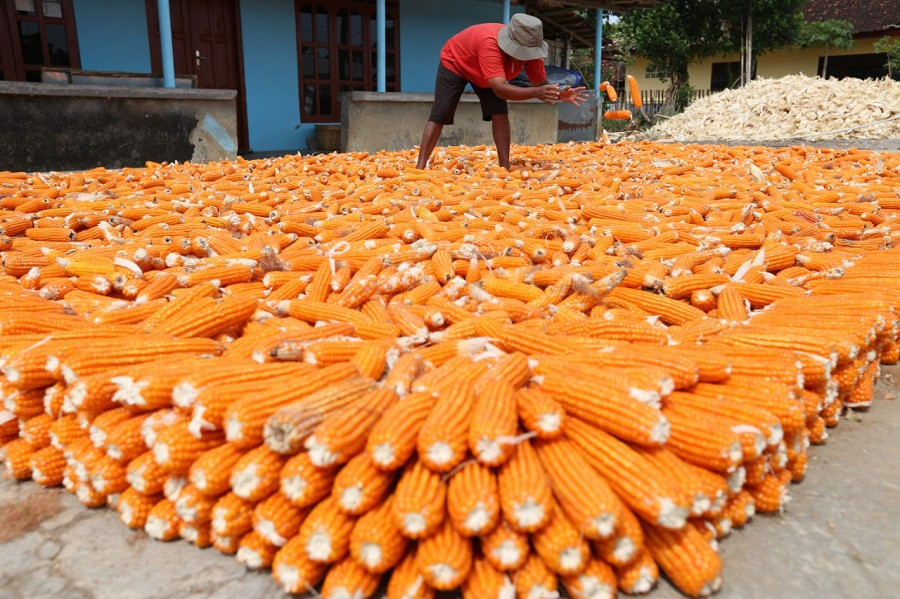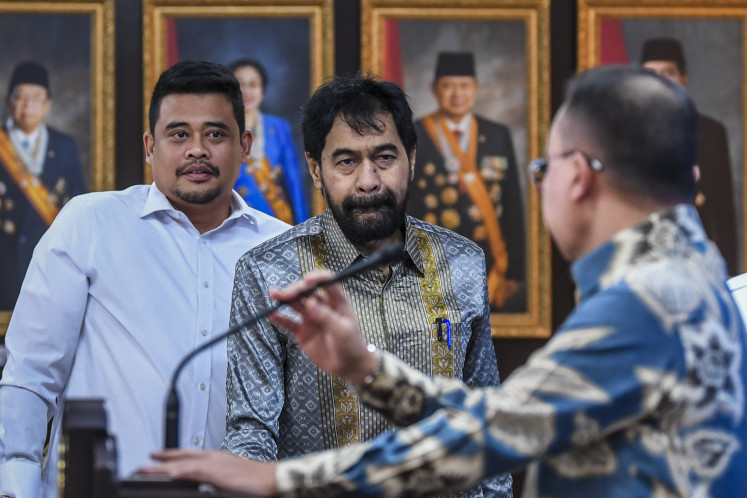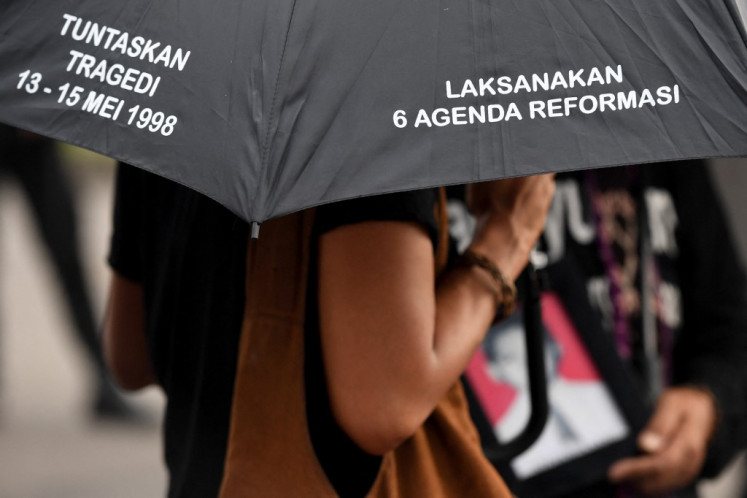Popular Reads
Top Results
Can't find what you're looking for?
View all search resultsPopular Reads
Top Results
Can't find what you're looking for?
View all search resultsGovt aims to combat food inflation with GMOs
Experts, farmers skeptical genetically modified crops plan would bring down soaring prices.
Change text size
Gift Premium Articles
to Anyone

T
he government is set on boosting the development of genetically modified organisms (GMOs), despite skepticism from experts and farmers that the plan would do much to solve the country’s food inflation issue.
Indonesia saw inflation jump to a seven-year high, reaching 4.94 percent year-on-year (yoy) in July, exceeding Bank Indonesia’s already revised outlook of 4.6 percent.
The government and the central bank blamed the inflation hike for skyrocketing volatile food components — inflation based on food prices — which reached 11.47 percent yoy that month.
Coordinating Economic Minister Airlangga Hartarto said the government sought to control inflation by ensuring sufficient domestic food supplies through the use of GMOs to boost farm yields.
Airlangga estimated that the use of GM corn could double production of the crop to between 12 and 13 tons per hectare (ha), from a previous range of between 5 and 6 tons per hectare.
This year, the government predicts cumulative corn production could reach 18 million tons, exceeding the 14 million tons needed for feedstocks.
“We have asked the Agriculture Ministry to change the regulations to make it easier for GMOs,” Airlangga said during a press briefing held by the Office of the Economic Minister on Aug. 5.
Read also: Inflation at seven-year high, exceeding BI’s revised outlook
Indonesia, like most emerging economies, is not immune to the impact of surging food prices induced by the current supply disruption, partly caused by climate change and the war in Ukraine.
The global food price index soared above 150 for four consecutive months before experiencing a steep drop to 140 in July, still higher than the score of 110 during the pre-pandemic era, Food and Agriculture Organization (FAO) data show.
Musdalifah Mahmud, undersecretary for food and agribusiness at the Office of the Coordinating Economic Minister, told The Jakarta Post that the government did not plan to relax the regulation on GMOs, saying the prevailing rules were sufficient to meet the country’s needs.
However, Musdalifah did confirm that the government wanted to step up the use of GMOs with the existing regulation, but she did not explain further how the ministry would execute the intensification efforts.
Ismail Wahab, cereals director at the Agriculture Ministry said on Tuesday that the ministry was still unable to reveal the details of the plan, but unveiled that the government was considering its implementation on corn.
He said that aside from the Agriculture Ministry, the Health Ministry and the Environment and Forestry Ministry were playing a role in decision making.
Risfaheri “Heri”, acting undersecretary for Food Availability and Stabilization at the National Food Agency (NFA), supported the plan, arguing that Indonesia needed GMOs to aid its food production.
GMOs are viable for at least two food commodities, namely soybeans and corn, with the country dependent on imports for more than 90 percent of the former, he said.
“If we want a major improvement in production, we need to be open to discussing [GMO application]. Without it, it is rather difficult for us to make a sharp increase in production,” Heri told the audience during an online discussion on Tuesday.
However, Heri expected it would not be easy to push for GMO adoption, as large parts of Indonesian society still opposed the plan over health and environmental concerns, which he criticized, as most of the tempeh and tofu widely consumed by Indonesians were produced from imported GMO-based soybeans.
This was confirmed in a 2020 survey that found more than 70 percent of respondents were reluctant to purchase genetically-modified food, but 90 percent did not realize they may have eaten tempeh or tofu made from GMO-based soybeans.
Henry Saragih, chairman of the Indonesian Farmers Union (SPI), said the union was against the GMO plan, stating that it would lead to high dependency on seeds and technologies produced by a few large corporations, which in the long run could threaten the livelihoods of farmers.
“We will stage a massive protest if the plan is realized,” Henry told the Post on Tuesday.
Henry pointed to the failure of GMO-based cotton introduced in the early 2000s, when productivity was far lower than that promised by a leading United States GMO company, despite the price being far higher than that of local seeds.
Moreover, the entry of the GM cotton was riddled with corruption after the Corruption Eradication Commission (KPK) found at least US$50,000 worth of bribes had been made to 140 Indonesian officials and their families between 1997 and 2002 in order to make way for the GMO seeds.
Dwi Andreas Santosa, member of the Indonesia Biosafety Clearing House for 10 years until 2018, which is a one-way door for GMO approval, suggested that GMOs might not be as effective as the government believed.
“Do GM plants have a much higher yield than non-GMOs? I don’t think so. You can see by comparing corn data from the Americas and Europe,” Dwi said in a discussion on Tuesday.
Read also: G20 finance chiefs agree to battle food insecurity, funding for vulnerable countries
Corn yields from 27 European Union countries – known for their low adoption of GMOs – were only 3 metric tons (t) per ha lower than the US, which scored 11 t/ha, according to Indexmundi.
Meanwhile, FAO data show the corn-yield gap between America and all of Europe was only 1.6 tons per ha apart in 2020, while in 2019 the gap was 0.6 tons per ha.
“So, in terms of productivity, it’s almost the same,” Dwi said, adding the only stark difference may be seen in the use of pesticides and herbicides.
Indonesian Political Economic Association (AEPI) agriculture expert Khudori suggested increasing production alone was not guaranteed to solve the food crisis and inflation unless accompanied by a sound distribution process and storage facilities.
“Without them, prices will remain high, because nonproducer regions would still be deprived of supplies,” Khudori told the Post on Tuesday, saying the government would still need to maintain the prosperity of farmers or face the risk of depriving manpower in the agriculture sector.








